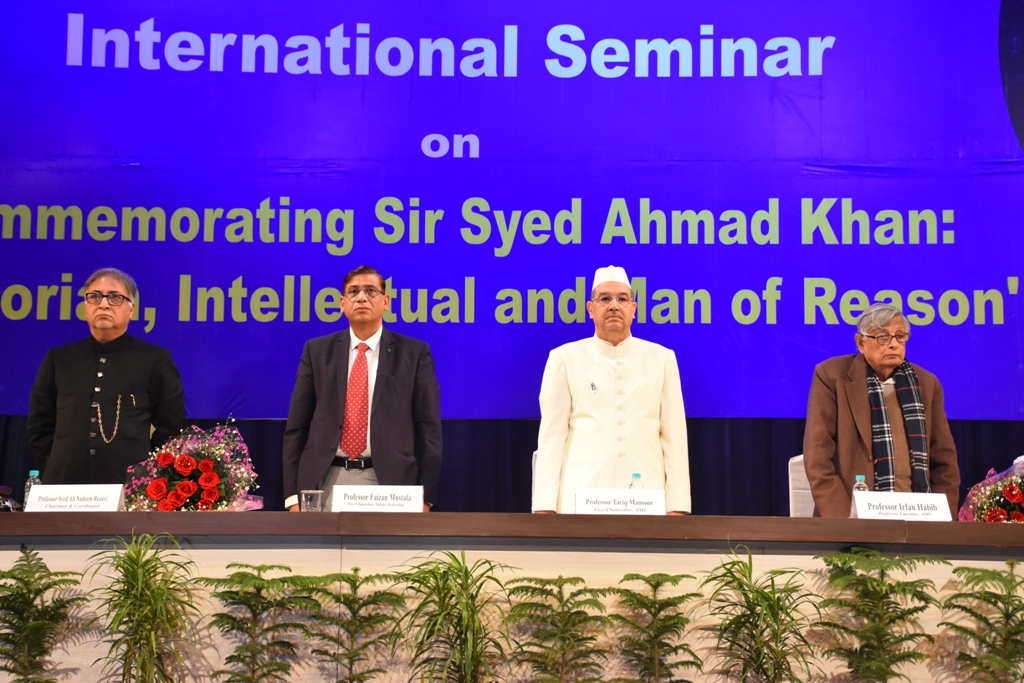International seminar on commemorating Sir Syed Ahmad Khan starts at AMU

By TCN News
Aligarh: The Centre of Advanced Study, Department of History, Aligarh Muslim University (AMU) started a three-day international seminar on ‘Commemorating Sir Syed Ahmad Khan: A Historian, Intellectual and a Man of Reason’ on Monday.
AMU Vice Chancellor, Professor Tariq Mansoor said that Sir Syed was a dynamic and a versatile genius gifted with a rare vision and intellect. “We have to judge a person, considering his time, space and the era he lived in and no aspersion can be cast on his vision in the changed social context. He was delivering presidential remarks in the seminar.
Prof Mansoor added that Sir Syed wrote his first book at the age of 20. “He has authored Aasar-us-Sanadeed, Khutbatul Ahmadiya, and Asbab-e-Bagawat-e-Hind among other books. Prof Mansoor further said that after 1857, Sir Syed realised that the British were too powerful to be resisted and there was a need to have reconciliation with them.
The Vice Chancellor congratulated The Centre of Advanced Study for organising the programme. “I am sure the deliberations in this three-day seminar will be very useful,” said Prof Mansoor.
Speaking at the seminar, Prof Faizan Mustafa (Vice Chancellor, NALSAR University of Law, Hyderabad) said that Mohammedan Anglo-Oriental (MAO) College and AMU are one and the same. “Even Supreme Court accepted MAO College as the nucleus of the university,” said Prof Mustafa.
He gave a detailed analysis of MAO College and said that these rules preserve autonomy and necessary governmental supervision. Prof Mustafa also said that the essence of these laws was retained by the Aligarh Muslim University Act of 1920 and that the government aid does not mean surrender of autonomy.
Prof Mustafa further said that the essence of these laws was retained by AMU Act of 1920. He added that government aid does not mean surrender of autonomy.
Prof Mustafa paid rich tributes to Sir Syed and said that his idea of specialised institutions with religious instructions was incorporated in Article 28 of Indian Constitution and motto of MAO College in the form of scientific temper and spirit of inquiry was included in the Constitution by the 42nd Amendment as a fundamental duty of citizens.
“Sir Syed wanted a university in the true sense of the word on Oxbridge model based on principles of pure morality, large heartedness and free inquiry,” said Prof Mustafa.
He pointed out that in a few years of the establishment of MAO College, there was a presence of a sizeable number of Non-Muslim students and AMU’s stature has always been based on its meritocracy, and not on any sectarian character.
“Sir Syed’s mission aimed at the intellectual development of people through modern education,” said Prof Mustafa pointing out that Sir Syed was the first Indian Muslim to contribute to the intellectual and institutional foundation of Muslim modernization in South Asia.
Prof Mustafa further said that Sir Syed made colossus contribution to the improvement and empowerment of Muslims.
“In 1847, he brought out an important book, Aasar-us-Sanadeed, a pioneering work on historical archaeology. Even more important was his pamphlet, The Causes of the Indian Revolt,” said Prof Mustafa pointing out that Sir Syed’s interest in religion was also active and lifelong as he wrote on the Life of Prophet Muhammad (Peace Be Upon Him) and dedicated himself to write several volumes of a modernist commentary on the Holy Quran. In these works, Sir Syed enlightened how the Islamic faith could go with advanced scientific and political ideas of his time.
Delineating ‘Sir Syed’s vision of Academic Governance of MAO College’, Prof Mustafa discussed at length a number of rules and laws framed by MAO College in which academic autonomy was given centrality.
Professor Irfan Habib (Emeritus Prof, AMU) said Sir Syed’s interpretation of religious texts reveal his commitment in the deep and consistent concern for rationality.
“Sir Syed said that Quran is the word of God and it cannot go against the laws of nature while urging common Muslims to have fresh interpretations,” said Prof Habib adding that Sir Syed stood by his views despite opposition from co-religionists of his time.
While conducting the programme, Prof Syed Ali Nadeem Rezavi (Chairperson and Coordinator, The Centre of Advanced Study, Department of History) said that Sir Syed was a pioneer of the discipline which is now known as historical archaeology. “Sir Syed undertook this venture even before Cunningham could begin this,” said Prof Rezavi. He also proposed the vote of thanks. Over 24 delegates from India and abroad are attending the seminar.
